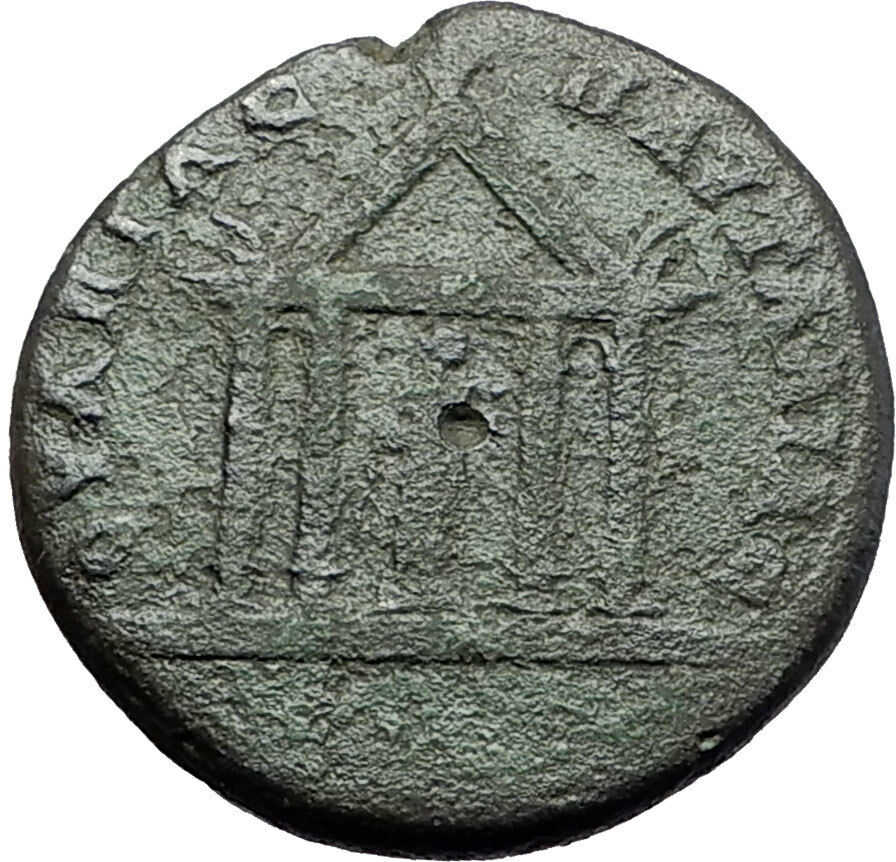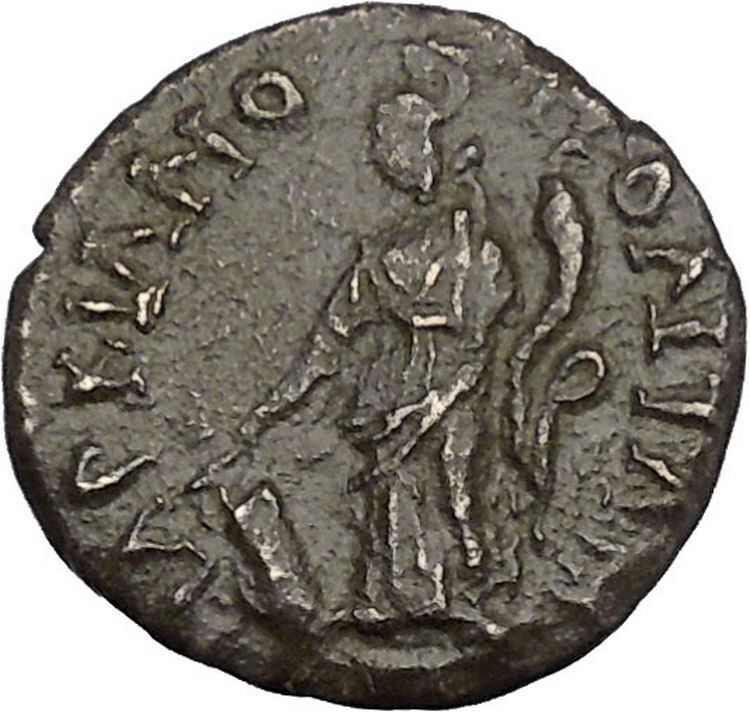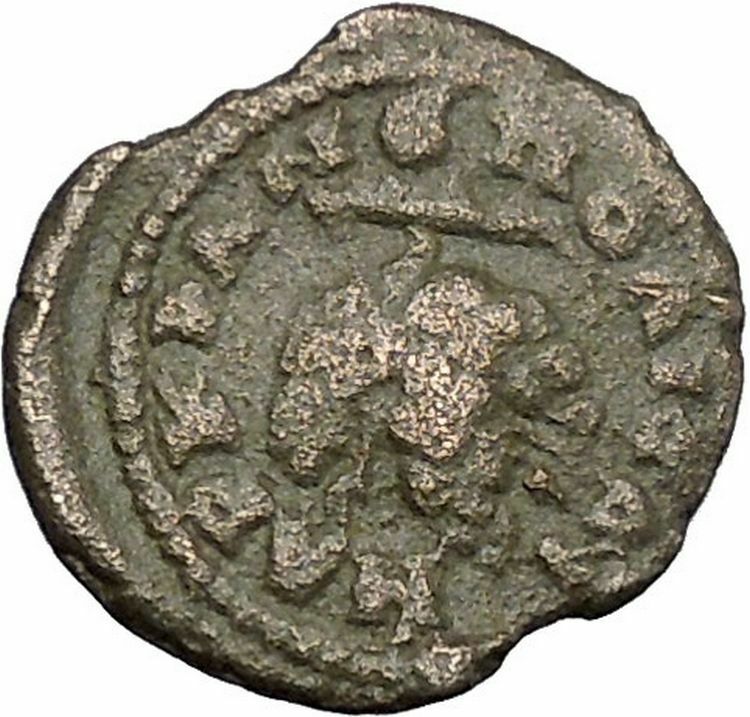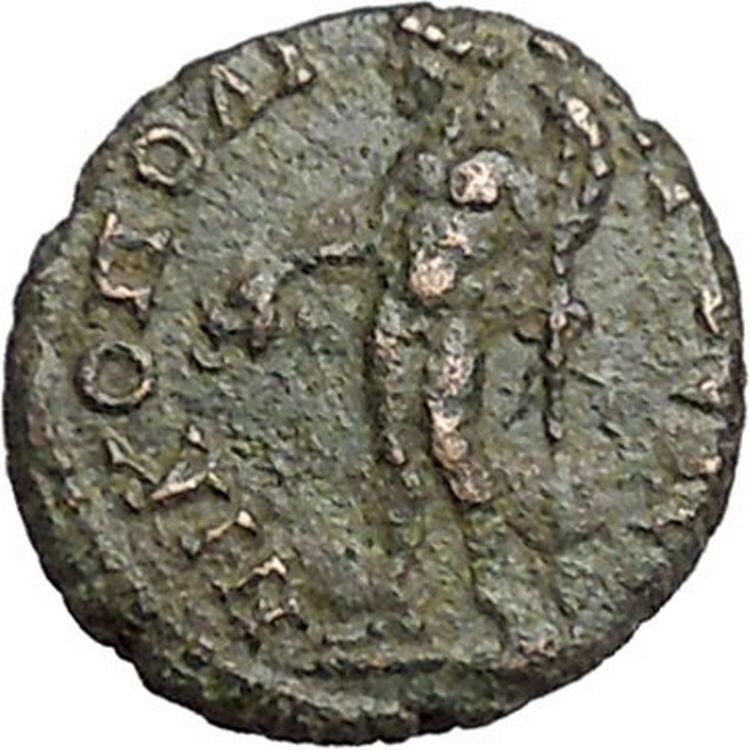|
Marcus Aurelius
–
Roman Emperor
: 161-180 A.D. –
Bronze 27mm (15.99 grams) of
Caesarea
in
Cappadocia
Reference: Sear GIC 1662; B.M.C. 20.68,183; Sydenham, Caesarea 344
AYTOKP. KAIC. M. AYPHΛ. ANTWNЄINOC CЄB., Laureate
head right.
ΔHMAPXIK. ЄΞOYC. KΔ ( = year 24 of his Tribunician Power = A.D. 169/170 ), Head
of Zeus Ammon right.
You are bidding on the exact
item pictured, provided with a Certificate of Authenticity and
Lifetime
Guarantee of Authenticity.
.jpg/220px-Zeus_Ammon_(Antikensammlung_München).jpg)
Zeus Ammon. Ammon was a surname of Zeus or Jupiter. The Greeks of the lower
Nile Delta and Cyrenaica combined features of supreme god
Zeus with features of the
Egyptian god Ammon-Ra.
Alexander the Great styled himself the son of Zeus-Ammon; his successors,
the kings of the Seleukid Kingdom and those of Cyrenaica have, on coins,
their heads adorned with the horns of a ram, or of Ammon, the symbol of
their dominion over Libya. This deity appears on a great number of coins and
engraved marbles. The Egyptians, for whom he was a popular divinity,
regarded him as the author of fecundity and generation. The same belief was
later introduced to the Romans who worshipped Ammon as the preserver of
nature.

Mount
Erciyes( Mons Argaeus in ancient times) is a massive
stratovolcano
located 25 km south of
Kayseri
,
Turkey
. Erciyes is the highest
mountain
in central
Anatolia
(3,916 metres). The volcano is heavily
eroded, but may have erupted as recently as
253 BC
, as may be depicted on
Roman era
coins.
Strabo
wrote that in his time the summit was
never free from snow and that those few who ascended it could see both the
Black Sea
and the
Mediterranean
.
Kayseri, named in
classical antiquity
as Mazaka or
Mazaca, Eusebia, Caesarea Cappadociae, and later as
Kaisariyah, is a large and industrialized
city
in
Central Anatolia
,
Turkey
. It is the seat of
Kayseri Province
.
Kayseri has been a continuous settlement since 3000 BC. The city has always
been a vital trade center since it is located on major trade routes,
particularly along what was called the
Great Silk Road
.
Kültepe
, one of the oldest cities in
Asia Minor
, lies nearby.
As Mazaca, the city served as the residence of the kings of
Cappadocia
. In ancient times, it was on the
crossroads of the trade routes from
Sinope
to the
Euphrates
and from the
Persian Royal Road
that extended from
Sardis
to
Susa. In
Roman
times, a similar route from
Ephesus
to the East also crossed the city.
The city’s name was changed to Eusebia in honor of the Cappadocian
king
Ariathes V
(163–130 BC). The name was changed
again to Caesarea by the last Cappadocian King
Archelaus
or perhaps by
Tiberius
.
Caesarea stood on a low spur on the north side of
Mount Erciyes
(Mons Argaeus in ancient
times). The site, now called the old town, diplays only a few traces from the
old town. It was destroyed by the
Sassanid
king
Shapur I of Persia
after his victory over the
Emperor Valerian I
in AD 260. At the time it
was recorded to have around 400,000 inhabitants. In the 4th century, bishop
Basil
established an ecclesiastical centre on
the plain, about one mile to the northeast, which gradually supplanted the old
town. A portion of Basil’s new city was surrounded with strong walls and turned
into a fortress by
Justinian
.
Marcus Aurelius (Latin:
Marcus Aurelius Antoninus Augustus;
26 April 121 AD – 17 March 180 AD) was a
Roman Emperor
from 161 to 180. He ruled with
Lucius Verus
as co-emperor from 161 until Verus’
death in 169. He was the last of the
Five Good Emperors
, and is also considered one
of the most important
Stoic
philosophers.
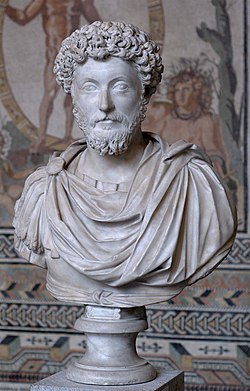
During his reign, the
Empire
defeated a revitalized
Parthian Empire
in the East; Aurelius’ general
Avidius Cassius
sacked the capital
Ctesiphon
in 164. In central Europe, Aurelius
fought the Marcomanni
,
Quadi
, and
Sarmatians
with success during the
Marcomannic Wars
, with the threat of the
Germanic tribes
beginning to represent a
troubling reality for the Empire. A revolt in the East led by Avidius Cassius
failed to gain momentum and was suppressed immediately.
Marcus Aurelius’
Stoic
tome
Meditations
, written in Greek while on
campaign between 170 and 180, is still revered as a literary monument to a
philosophy of service and duty, describing how to find and preserve equanimity
in the midst of conflict by following nature as a source of guidance and
inspiration.
Sources
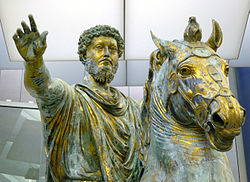
The
Statue of Marcus Aurelius
(detail)
in the
Musei Capitolini
in Rome.
The major sources for the life and rule of Marcus Aurelius are patchy and
frequently unreliable. The most important group of sources, the biographies
contained in the
Historia Augusta
, claim to be written by a
group of authors at the turn of the 4th century, but are in fact written by a
single author (referred to here as “the biographer”) from the later 4th century
(c. 395).
The later biographies and the biographies of subordinate emperors and
usurpers are a tissue of lies and fiction, but the earlier biographies, derived
primarily from now-lost earlier sources (Marius
Maximus or Ignotus), are much more accurate. For Marcus’ life and
rule, the biographies of
Hadrian
, Antoninus Pius, Marcus and Lucius
Verus are largely reliable, but those of Aelius Verus and Avidius Cassius are
full of fiction.
Tutor Fronto and various Antonine officials survives in a series of patchy
manuscripts, covering the period from c. 138 to 166. Marcus’ own Meditations
offer a window on his inner life, but are largely undateable, and make few
specific references to worldly affairs. The main narrative source for the period
is Cassius Dio
, a Greek senator from
Bithynian
Nicaea
who wrote a history of Rome from its
founding to 229 in eighty books. Dio is vital for the military history of the
period, but his senatorial prejudices and strong opposition to imperial
expansion obscure his perspective.
Some other literary sources provide specific detail: the writings of the
physician Galen
on the habits of the Antonine elite, the
orations of
Aelius Aristides
on the temper of the times,
and the constitutions preserved in the Digest and Codex Justinianus
on Marcus’ legal work.
Inscriptions
and
coin finds
supplement the literary sources.
Early life and career
Marcus’ family originated in
Ucubi
, a small town southeast of
Córdoba
in Iberian
Baetica
. The family rose to prominence in the
late 1st century AD. Marcus’ great-grandfather Marcus Annius Verus (I) was a
senator
and (according to the Historia
Augusta) ex-praetor;
in 73–74, his grandfather,
Marcus Annius Verus (II)
, was made a
patrician
. Verus’ elder son—Marcus Aurelius’
father—Marcus
Annius Verus (III) married
Domitia Lucilla
.
Lucilla was the daughter of the patrician P. Calvisius Tullus Ruso and the
elder Domitia Lucilla. The elder Domitia Lucilla had inherited a great fortune
(described at length in one of
Pliny
‘s letters) from her maternal grandfather
and her paternal grandfather by adoption. The younger Lucilla would acquire much
of her mother’s wealth, including a large brickworks on the outskirts of Rome—a
profitable enterprise in an era when the city was experiencing a construction
boom.

A bust of Marcus Aurelius as a young boy (Capitoline
Museum). Anthony Birley, Marcus’ modern biographer,
writes of the bust: “This is certainly a grave young man.”
Lucilla and Verus (III) had two children: a son, Marcus, born on 26 April
121, and a daughter,
Annia Cornificia Faustina
, probably born in 122
or 123. Verus (III) probably died in 124, during his
praetorship
, when Marcus was only three years
old.Though he can hardly have known him, Marcus Aurelius wrote in his
Meditations that he had learned “modesty and manliness” from his memories of
his father and from the man’s posthumous reputation. Lucilla did not remarry.
.JPG/220px-0_Marcus_Aurelius_-_Palazzo_Nuovo_-_Musei_Capitolini_(1).JPG)
Portrait of Emperor Marcus Aurelius –
Palazzo Nuovo
(Musei
Capitolini).
Lucilla, following prevailing aristocratic customs, probably did not spend
much time with her son. Marcus was in the care of “nurses”. Even so, Marcus
credits his mother with teaching him “religious piety, simplicity in diet” and
how to avoid “the ways of the rich”. In his letters, Marcus makes frequent and
affectionate reference to her; he was grateful that, “although she was fated to
die young, yet she spent her last years with me”.
After his father’s death, Aurelius was adopted by his paternal grandfather
Marcus Annius Verus (II). Another man,
Lucius Catilius Severus
, also participated in
his upbringing. Severus is described as Marcus’ “maternal great-grandfather”; he
is probably the stepfather of the elder Lucilla. Marcus was raised in his
parents’ home on the
Caelian Hill
, a district he would
affectionately refer to as “my Caelian”.
It was an upscale region, with few public buildings but many aristocratic
villas. Marcus’ grandfather owned his own palace beside the
Lateran
, where Marcus would spend much of his
childhood. Marcus thanks his grandfather for teaching him “good character and
avoidance of bad temper”. He was less fond of the mistress his grandfather took
and lived with after the death of Rupilia Faustina, his wife. Marcus was
grateful that he did not have to live with her longer than he did.
Marcus was taught at home, in line with contemporary aristocratic trends;
Marcus thanks
Catilius Severus
for encouraging him to avoid
public schools. One of his teachers, Diognetus, a painting-master, proved
particularly influential; he seems to have introduced Marcus to the philosophic
way of life. In April 132, at the behest of Diognetus, Marcus took up the dress
and habits of the philosopher: he studied while wearing a rough Greek cloak, and
would sleep on the ground until his mother convinced him to sleep on a bed.
A new set of tutors—Alexander
of Cotiaeum, Trosius Aper, and Tuticius Proculus—took over Marcus’
education in about 132 or 133. Little is known of the latter two (both teachers
of Latin), but Alexander was a major littérateur, the leading
Homeric
scholar of his day. Marcus thanks
Alexander for his training in literary styling. Alexander’s influence—an
emphasis on matter over style, on careful wording, with the occasional Homeric
quotation—has been detected in Marcus’ Meditations.
Succession to Hadrian, 136–38
In late 136, Hadrian almost died from
hemorrhage
. Convalescent in
his villa
at
Tivoli
, he selected Lucius Ceionius Commodus as
his successor, and adopted him as his son. The selection was done invitis
omnibus, “against the wishes of everyone”; its rationale is still unclear.
After a brief stationing on the Danube frontier, Lucius returned to Rome to make
an address to the senate on the first day of 138. The night before the speech,
however, he grew ill, and died of a hemorrhage later in the day.[notes
5] On 24 January 138, Hadrian selected
Aurelius Antoninus
as his new successor.
After a few days’ consideration, Antoninus accepted. He was adopted on 25
February. As part of Hadrian’s terms, Antoninus adopted Marcus and
Lucius Verus
, the son of Aelius. Marcus became
M. Aelius Aurelius Verus; Lucius became L. Aelius Aurelius Commodus. At
Hadrian’s request, Antoninus’ daughter Faustina was betrothed to Lucius. Marcus
was appalled to learn that Hadrian had adopted him. Only with reluctance did he
move from his mother’s house on the Caelian to Hadrian’s private home.
At some time in 138, Hadrian requested in the senate that Marcus be exempt
from the law barring him from becoming
quaestor
before his twenty-fourth birthday.
The senate complied, and Marcus served under Antoninus, consul for 139. Marcus’
adoption diverted him from the typical career path of his class. But for his
adoption, he probably would have become
triumvir monetalis
, a highly regarded post
involving token administration of the state mint; after that, he could have
served as
tribune with a legion
, becoming the legion’s
nominal second-in-command. Marcus probably would have opted for travel and
further education instead. As it was, Marcus was set apart from his fellow
citizens. Nonetheless, his biographer attests that his character remained
unaffected: “He still showed the same respect to his relations as he had when he
was an ordinary citizen, and he was as thrifty and careful of his possessions as
he had been when he lived in a private household.”
After a series of suicide attempts, all thwarted by Antoninus, Hadrian left
for Baiae
, a seaside resort on the
Campanian
coast. His condition did not improve,
and he abandoned the diet prescribed by his doctors, indulging himself in food
and drink. He sent for Antoninus, who was at his side when he died on 10 July
138. His remains were buried quietly at
Puteoli
. The succession to Antoninus was
peaceful and stable: Antoninus kept Hadrian’s nominees in office and appeased
the senate, respecting its privileges and commuting the death sentences of men
charged in Hadrian’s last days. For his dutiful behavior, Antoninus was asked to
accept the name “Pius”.
Heir
to Antoninus Pius, 138–45
Immediately after Hadrian’s death, Antoninus approached Marcus and requested
that his marriage arrangements be amended: Marcus’ betrothal to Ceionia Fabia
would be annulled, and he would be betrothed to Faustina, Antoninus’ daughter,
instead. Faustina’s betrothal to Ceionia’s brother Lucius Commodus would also
have to be annulled. Marcus consented to Antoninus’ proposal.
Antoninus bolstered Marcus’ dignity: Marcus was made consul for 140, with
Antoninus as his colleague, and was appointed as a seviri, one of the
knights’ six commanders, at the order’s annual parade on 15 July 139. As the
heir apparent, Marcus became princeps iuventutis, head of the equestrian
order. He now took the name Caesar: Marcus Aelius Aurelius Verus Caesar. Marcus
would later caution himself against taking the name too seriously: “See that you
do not turn into a Caesar; do not be dipped into the purple dye—for that can
happen”. At the senate’s request, Marcus joined all the priestly colleges (pontifices,
augures, quindecimviri sacris faciundis, septemviri epulonum,
etc.); direct evidence for membership, however, is available only for the
Arval Brethren
.
Antoninus demanded that Marcus take up residence in the House of Tiberius,
the imperial palace on the Palatine. Antoninus also made him take up the habits
of his new station, the aulicum fastigium or “pomp of the court”, against
Marcus’ objections. Marcus would struggle to reconcile the life of the court
with his philosophic yearnings. He told himself it was an attainable goal—”where
life is possible, then it is possible to live the right life; life is possible
in a palace, so it is possible to live the right life in a palace”—but he found
it difficult nonetheless. He would criticize himself in the Meditations
for “abusing court life” in front of company.
As quaestor, Marcus would have had little real administrative work to do. He
would read imperial letters to the senate when Antoninus was absent, and would
do secretarial work for the senators. His duties as consul were more
significant: one of two senior representatives of the senate, he would preside
over meetings and take a major role in the body’s administrative functions. He
felt drowned in paperwork, and complained to his tutor,
Fronto
: “I am so out of breath from dictating
nearly thirty letters”. He was being “fitted for ruling the state”, in the words
of his biographer. He was required to make a speech to the assembled senators as
well, making oratorical training essential for the job.
On 1 January 145, Marcus was made consul a second time. He might have been
unwell at this time: a letter from Fronto that might have been sent at this time
urges Marcus to have plenty of sleep “so that you may come into the Senate with
a good colour and read your speech with a strong voice”. Marcus had complained
of an illness in an earlier letter: “As far as my strength is concerned, I am
beginning to get it back; and there is no trace of the pain in my chest. But
that ulcer […] I am having treatment and taking care not to do anything that
interferes with it.” Marcus was never particularly healthy or strong. The Roman
historian Cassius Dio, writing of his later years, praised him for behaving
dutifully in spite of his various illnesses.
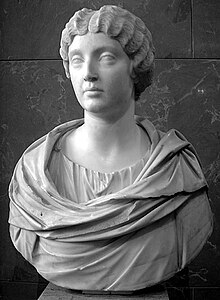
A bust of
Faustina the Younger
, Marcus’ wife
(Louvre).
In April 145, Marcus married Faustina, as had been planned since 138. Since
Marcus was, by adoption, Antoninus Pius’ son, under Roman law he was marrying
his sister; Antoninus would have had to formally release one or the other from
his paternal authority (his
patria potestas
) for the ceremony to take
place. Little is specifically known of the ceremony, but it is said to have been
“noteworthy”. Coins were issued with the heads of the couple, and Antoninus, as
Pontifex Maximus
, would have officiated.
Marcus makes no apparent reference to the marriage in his surviving letters, and
only sparing references to Faustina.
Fronto and further education, 136–61
After taking the toga virilis in 136, Marcus probably began his
training in oratory
. He had three tutors in Greek, Aninus
Macer, Caninius Celer, and
Herodes Atticus
, and one in Latin, Fronto. The
latter two were the most esteemed orators of the day. (Fronto and Atticus,
however, probably did not become his tutors until his adoption by Antoninus in
138.) The preponderance of Greek tutors indicates the importance of the language
to the aristocracy of Rome. This was the age of the
Second Sophistic
, a renaissance in Greek
letters. Although educated in Rome, in his Meditations, Marcus would
write his inmost thoughts in Greek.
Herodes was controversial: an enormously rich Athenian (probably the richest
man in the eastern half of the empire), he was quick to anger, and resented by
his fellow-Athenians for his patronizing manner. Atticus was an inveterate
opponent of Stoicism and philosophic pretensions. He thought the Stoics’ desire
for a “lack of feeling” foolish: they would live a “sluggish, enervated life”,
he said. Marcus would become a Stoic. He would not mention Herodes at all in his
Meditations, in spite of the fact that they would come into contact many
times over the following decades.
Fronto was highly esteemed: In the self-consciously antiquarian world of
Latin letters, he was thought of as second only to
Cicero
, perhaps even an alternative to him.He
did not care much for Herodes, though Marcus was eventually to put the pair on
speaking terms. Fronto exercised a complete mastery of Latin, capable of tracing
expressions through the literature, producing obscure synonyms, and challenging
minor improprieties in word choice.
A significant amount of the correspondence between Fronto and Marcus has
survived. The pair were very close. “Farewell my Fronto, wherever you are, my
most sweet love and delight. How is it between you and me? I love you and you
are not here.” Marcus spent time with Fronto’s wife and daughter, both named
Cratia, and they enjoyed light conversation.
He wrote Fronto a letter on his birthday, claiming to love him as he loved
himself, and calling on the gods to ensure that every word he learned of
literature, he would learn “from the lips of Fronto”. His prayers for Fronto’s
health were more than conventional, because Fronto was frequently ill; at times,
he seems to be an almost constant invalid, always suffering—about one-quarter of
the surviving letters deal with the man’s sicknesses. Marcus asks that Fronto’s
pain be inflicted on himself, “of my own accord with every kind of discomfort”.
Fronto never became Marcus’ full-time teacher, and continued his career as an
advocate. One notorious case brought him into conflict with Herodes. Marcus
pleaded with Fronto, first with “advice”, then as a “favor”, not to attack
Herodes; he had already asked Herodes to refrain from making the first blows.
Fronto replied that he was surprised to discover Marcus counted Herodes as a
friend (perhaps Herodes was not yet Marcus’ tutor), allowed that Marcus might be
correct, but nonetheless affirmed his intent to win the case by any means
necessary: “…the charges are frightful and must be spoken of as frightful.
Those in particular which refer to the beating and robbing I will describe in
such a way that they savour of gall and bile. If I happen to call him an
uneducated little Greek it will not mean war to the death.” The outcome of the
trial is unknown.
By the age of twenty-five (between April 146 and April 147), Marcus had grown
disaffected with his studies in jurisprudence, and showed some signs of general
malaise. His master, he writes to Fronto, was an unpleasant blowhard, and had
made “a hit at” him: “It is easy to sit yawning next to a judge, he says, but to
be a judge is noble work.” Marcus had grown tired of his exercises, of
taking positions in imaginary debates. When he criticized the insincerity of
conventional language, Fronto took to defend it. In any case, Marcus’ formal
education was now over. He had kept his teachers on good terms, following them
devotedly. It “affected his health adversely”, his biographer writes, to have
devoted so much effort to his studies. It was the only thing the biographer
could find fault with in Marcus’ entire boyhood.
Fronto had warned Marcus against the study of philosophy early on: “it is
better never to have touched the teaching of philosophy…than to have tasted it
superficially, with the edge of the lips, as the saying is”. He disdained
philosophy and philosophers, and looked down on Marcus’ sessions with Apollonius
of Chalcedon and others in this circle. Fronto put an uncharitable
interpretation of Marcus’ “conversion to philosophy”: “in the fashion of the
young, tired of boring work”, Marcus had turned to philosophy to escape the
constant exercises of oratorical training. Marcus kept in close touch with
Fronto, but he would ignore his scruples.
Apollonius may have introduced Marcus to Stoic philosophy, but
Quintus Junius Rusticus
would have the
strongest influence on the boy.He was the man Fronto recognized as having “wooed
Marcus away” from oratory. He was twenty years older than Marcus, older than
Fronto. As the grandson of
Arulenus Rusticus
, one of the martyrs to the
tyranny of Domitian
(r. 81–96), he was heir to the
tradition of “Stoic opposition” to the “bad emperors” of the 1st century; the
true successor of
Seneca
(as opposed to Fronto, the false one).
Marcus thanks Rusticus for teaching him “not to be led astray into enthusiasm
for rhetoric, for writing on speculative themes, for discoursing on moralizing
texts…To avoid oratory, poetry, and ‘fine writing'”.
Births
and deaths, 147–160
On November 30, 147, Faustina gave birth to a girl, named Domitia Faustina.
She was the first of at least thirteen children (including two sets of twins)
that Faustina would bear over the next twenty-three years. The next day, 1
December, Antoninus Pius gave Marcus the
tribunician
power and the
imperium
—authority over the armies and
provinces of the emperor. As tribune, Marcus had the right to bring one measure
before the senate after the four Antoninus could introduce. His tribunican
powers would be renewed, with Antoninus’, on 10 December 147.
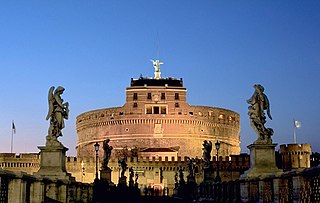
The
Mausoleum of Hadrian
, where the
children of Marcus and Faustina were buried.
The first mention of Domitia in Marcus’ letters reveals her as a sickly
infant. “Caesar to Fronto. If the gods are willing we seem to have a hope of
recovery. The diarrhoea has stopped, the little attacks of fever have been
driven away. But the emaciation is still extreme and there is still quite a bit
of coughing.” He and Faustina, Marcus wrote, had been “pretty occupied” with the
girl’s care. Domitia would die in 151.
In 149, Faustina gave birth again, to twin sons. Contemporary coinage
commemorates the event, with crossed cornucopiae beneath portrait busts of the
two small boys, and the legend temporum felicitas, “the happiness of the
times”. They did not survive long. Before the end of the year, another family
coin was issued: it shows only a tiny girl, Domitia Faustina, and one boy baby.
Then another: the girl alone. The infants were buried in the
Mausoleum of Hadrian
, where their epitaphs
survive. They were called Titus Aurelius Antoninus and Tiberius Aelius Aurelius.
Another daughter was born on 7 March 150,
Annia Aurelia Galeria Lucilla
. At some time
between 155 and 161, probably soon after 155, Marcus’ mother, Domitia Lucilla,
died. Faustina probably had another daughter in 151, but the child, Annia
Galeria Aurelia Faustina, might not have been born until 153. Another son,
Tiberius Aelius Antoninus, was born in 152. A coin issue celebrates
fecunditati Augustae, “the Augusta’s fertility”, depicting two girls and an
infant. The boy did not survive long; on coins from 156, only the two girls were
depicted. He might have died in 152, the same year as Marcus’ sister,
Cornificia.
By 28 March 158, however, when Marcus replied, the child was dead. Marcus
thanked the temple synod, “even though this turned out otherwise”. The child’s
name is unknown. In 159 and 160, Faustina gave birth to daughters: Fadilla,
after one of Faustina’s dead sisters, and Cornificia, after Marcus’ dead sister.
Antoninus Pius’ last years, 152–61
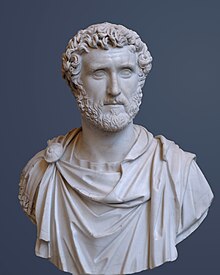
Antoninus Pius
, Marcus’ adoptive
father and predecessor as emperor (Glyptothek).
In 152, Lucius was named quaestor for 153, two years before the legal age of
25 (Marcus held the office at 17). In 154, he was consul, nine years before the
legal age of 32 (Marcus held the office at 18 and 23). Lucius had no other
titles, except that of “son of Augustus”. Lucius had a markedly different
personality from Marcus: he enjoyed sports of all kinds, but especially hunting
and wrestling; he took obvious pleasure in the circus games and gladiatorial
fights. He did not marry until 164. Antoninus Pius was not fond of his adopted
son’s interests. He would keep Lucius in the family, but he was sure never to
give the boy either power or glory. To take a typical example, Lucius would not
appear on Alexandrian coinage until 160/1.
In 156, Antoninus Pius turned 70. He found it difficult to keep himself
upright without stays
. He started nibbling on dry bread to give
him the strength to stay awake through his morning receptions. As Antoninus
aged, Marcus would have taken on more administrative duties, more still when the
praetorian prefect
(an office that was as much
secretarial as military) Gavius Maximus died in 156 or 157. In 160, Marcus and
Lucius were designated joint consuls for the following year. Perhaps Antoninus
was already ill; in any case, he died before the year was out.
Two days before his death, the biographer reports, Antoninus was at his
ancestral estate in Lorium
. He ate Alpine cheese at dinner quite
greedily. In the night he vomited; he had a fever the next day. The day after
that, 7 March 161, he summoned the imperial council, and passed the state and
his daughter to Marcus. He ordered that the golden statue of Fortune, which had
been in the bedroom of the emperors, should go to Marcus’ bedroom. Antoninus
turned over, as if going to sleep, and died.
Emperor
Accession of Marcus and Lucius, 161
After the death of Antoninus Pius, Marcus was effectively sole ruler of the
Empire. The formalities of the position would follow: The senate would soon
grant him the name Augustus and the title
imperator
, and he would soon be formally
elected as
Pontifex Maximus
, chief priest of the
official cults. Marcus made some show of resistance: the biographer writes that
he was “compelled” to take imperial power. This may have been a genuine
horror imperii, “fear of imperial power”. Marcus, with his preference for
the philosophic life, found the imperial office unappealing. His training as a
Stoic, however, had made the choice clear. It was his duty.
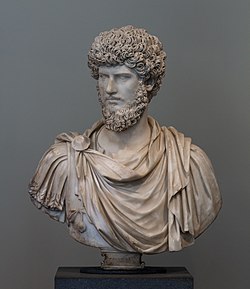
Lucius Verus, Marcus’ co-emperor from 161 to Verus’ death in 169 (Metropolitan
Museum of Art lent by
Musée du Louvre
).
Although Marcus shows no personal affection for Hadrian (significantly, he
does not thank him in the first book of his Meditations), he presumably
believed it his duty to enact the man’s succession plans. Thus, although the
senate planned to confirm Marcus alone, he refused to take office unless Lucius
received equal powers. The senate accepted, granting Lucius the imperium,
the tribunician power, and the name Augustus. Marcus became, in official
titulature, Imperator Caesar Marcus Aurelius Antoninus Augustus; Lucius,
forgoing his name Commodus and taking Marcus’ family name, Verus, became
Imperator Caesar Lucius Aurelius Verus Augustus. It was the first time that Rome
was ruled by two emperors.
In spite of their nominal equality, Marcus held more
auctoritas
, or “authority”, than Lucius. He
had been consul once more than Lucius, he had shared in Antoninus’
administration, and he alone was Pontifex Maximus. It would have been
clear to the public which emperor was the more senior. As the biographer wrote,
“Verus obeyed Marcus…as a lieutenant obeys a proconsul or a governor obeys the
emperor.”
Immediately after their senate confirmation, the emperors proceeded to the
Castra Praetoria
, the camp of the
praetorian guard
. Lucius addressed the
assembled troops, which then acclaimed the pair as imperatores. Then,
like every new emperor since Claudius, Lucius promised the troops a special
donative. This donative, however, was twice the size of those past: 20,000
sesterces
(5,000
denarii
) per capita, with more to officers. In
return for this bounty, equivalent to several years’ pay, the troops swore an
oath to protect the emperors. The ceremony was perhaps not entirely necessary,
given that Marcus’ accession had been peaceful and unopposed, but it was good
insurance against later military troubles.
Upon his accession he also devalued the
Roman currency
. He decreased the silver purity
of the denarius from 83.5% to 79% — the silver weight dropping from 2.68 grams
to 2.57 grams. However, Marcus would later revisit the issue of currency reform.
Antoninus Pius’ funeral ceremonies were, in the words of the biographer,
“elaborate”. If his funeral followed the pattern of past funerals, his body
would have been incinerated on a pyre at the
Campus Martius
, while his spirit would rise to
the gods’ home in the heavens. Marcus and Lucius nominated their father for
deification. In contrast to their behavior during Antoninus’ campaign to deify
Hadrian, the senate did not oppose the emperors’ wishes. A
flamen
, or cultic priest, was appointed to
minister the cult of the deified Antoninus, now Divus Antoninus.
Antoninus Pius’ remains were laid to rest in the Hadrian’s mausoleum, beside the
remains of Marcus’ children and of Hadrian himself. The temple he had dedicated
to his wife, Diva Faustina, became the
Temple of Antoninus and Faustina
. It survives
as the church of San Lorenzo in Miranda.
In accordance with his will, Antoninus’ fortune passed on to Faustina.
(Marcus had little need of his wife’s fortune. Indeed, at his accession, Marcus
transferred part of his mother’s estate to his nephew, Ummius Quadratus.)
Faustina was three months pregnant at her husband’s accession. During the
pregnancy she dreamed of giving birth to two serpents, one fiercer than the
other. On 31 August she gave birth at
Lanuvium
to twins: T. Aurelius Fulvus Antoninus
and Lucius Aurelius Commodus. Aside from the fact that the twins shared
Caligula
‘s birthday, the omens were favorable,
and the astrologers drew positive horoscopes for the children. The births were
celebrated on the imperial coinage.
Early rule,
161–62
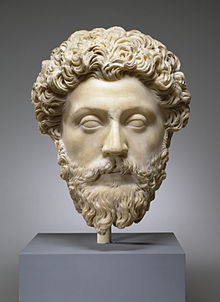
This marble portrait depicts Marcus Aurelius (reigned AD 161-180)
The Walters Art Museum.
Soon after the emperors’ accession, Marcus’ eleven-year-old daughter, Annia
Lucilla, was betrothed to Lucius (in spite of the fact that he was, formally,
her uncle). At the ceremonies commemorating the event, new provisions were made
for the support of poor children, along the lines of earlier imperial
foundations. Marcus and Lucius proved popular with the people of Rome, who
strongly approved of their civiliter (“lacking pomp”) behavior. The
emperors permitted free speech, evidenced by the fact that the comedy writer
Marullus was able to criticize them without suffering retribution. At any other
time, under any other emperor, he would have been executed. But it was a
peaceful time, a forgiving time. And thus, as the biographer wrote, “No one
missed the lenient ways of Pius.”
Marcus replaced a number of the empire’s major officials. The ab epistulis
Sextus Caecilius Crescens Volusianus, in charge of the imperial correspondence,
was replaced with Titus Varius Clemens. Clemens was from the frontier province
of Pannonia and had served in the war in Mauretania. Recently, he had served as
procurator of five provinces. He was a man suited for a time of military crisis.
Lucius Volusius Maecianus, Marcus’ former tutor, had been prefectural governor
of Egypt at Marcus’ accession. Maecianus was recalled, made senator, and
appointed prefect of the treasury (aerarium
Saturni). He was made consul soon after. Fronto’s son-in-law,
Aufidius Victorinus, was appointed governor of
Upper Germany
.
Fronto returned to his Roman townhouse at dawn on 28 March, having left his
home in Cirta
as soon as news of his pupils’ accession
reached him. He sent a note to the imperial freedman Charilas, asking if he
could call on the emperors. Fronto would later explain that he had not dared to
write the emperors directly. The tutor was immensely proud of his students.
Reflecting on the speech he had written on taking his consulship in 143, when he
had praised the young Marcus, Fronto was ebullient: “There was then an
outstanding natural ability in you; there is now perfected excellence. There was
then a crop of growing corn; there is now a ripe, gathered harvest. What I was
hoping for then, I have now. The hope has become a reality.” Fronto called on
Marcus alone; neither thought to invite Lucius.
Lucius was less esteemed by his tutor than his brother, as his interests were
on a lower level. Lucius asked Fronto to adjudicate in a dispute he and his
friend Calpurnius were having on the relative merits of two actors. Marcus told
Fronto of his reading—Coelius
and a little Cicero—and his family. His daughters were in Rome, with their
great-great-aunt Matidia; Marcus thought the evening air of the country was too
cold for them. He asked Fronto for “some particularly eloquent reading matter,
something of your own, or Cato, or Cicero, or Sallust or Gracchus—or some poet,
for I need distraction, especially in this kind of way, by reading something
that will uplift and diffuse my pressing anxieties.”
Marcus’ early reign proceeded smoothly. Marcus was able to give himself
wholly to philosophy and the pursuit of popular affection. Soon, however, Marcus
would find he had many anxieties. It would mean the end of the felicitas
temporum (“happy times”) that the coinage of 161 had so glibly proclaimed.
In the spring of 162, the
Tiber
flooded over its banks, destroying much
of Rome. It drowned many animals, leaving the city in famine. Marcus and Lucius
gave the crisis their personal attention.In other times of famine, the emperors
are said to have provided for the Italian communities out of the Roman
granaries.
Fronto’s letters continued through Marcus’ early reign. Fronto felt that,
because of Marcus’ prominence and public duties, lessons were more important now
than they had ever been before. He believed Marcus was “beginning to feel the
wish to be eloquent once more, in spite of having for a time lost interest in
eloquence”. Fronto would again remind his pupil of the tension between his role
and his philosophic pretensions: “Suppose, Caesar, that you can attain to the
wisdom of Cleanthes
and
Zeno
, yet, against your will, not the
philosopher’s woolen cape.”
The early days of Marcus’ reign were the happiest of Fronto’s life: his pupil
was beloved by the people of Rome, an excellent emperor, a fond pupil, and,
perhaps most importantly, as eloquent as could be wished. Marcus had displayed
rhetorical skill in his speech to the senate after an earthquake at
Cyzicus
. It had conveyed the drama of the
disaster, and the senate had been awed: “not more suddenly or violently was the
city stirred by the earthquake than the minds of your hearers by your speech”.
Fronto was hugely pleased.
War with
Parthia, 161–66
Origins to Lucius’ dispatch, 161–62
On his deathbed, Antoninus Pius spoke of nothing but the state and the
foreign kings who had wronged him. One of those kings,
Vologases IV of Parthia
, made his move in late
summer or early autumn 161. Vologases entered the
Kingdom of Armenia
(then a Roman client state),
expelled its king and installed his own—Pacorus,
an
Arsacid
like himself. The governor of
Cappadocia, the front-line in all Armenian conflicts, was Marcus Sedatius
Severianus, a Gaul with much experience in military matters.
Convinced by the prophet
Alexander of Abonutichus
that he could defeat
the Parthians easily, and win glory for himself, Severianus led a legion
(perhaps the
IX Hispana
) into Armenia, but was trapped by
the great Parthian general Chosrhoes at Elegia, a town just beyond the
Cappadocian frontiers, high up past the headwaters of the Euphrates. Severianus
made some attempt to fight Chosrhoes, but soon realized the futility of his
campaign, and committed suicide. His legion was massacred. The campaign had only
lasted three days.

Coin of
Vologases IV
, king of Parthia, from
152/53.
There was threat of war on other frontiers as well—in Britain, and in
Raetia
and
Upper Germany
, where the
Chatti
of the
Taunus
mountains had recently crossed over the
limes. Marcus was unprepared. Antoninus seems to have given him no
military experience; the biographer writes that Marcus spent the whole of
Antoninus’ twenty-three-year reign at his emperor’s side—and not in the
provinces, where most previous emperors had spent their early careers.
More bad news arrived: the Syrian governor’s army had been defeated by the
Parthians, and retreated in disarray. Reinforcements were dispatched for the
Parthian frontier. P. Julius Geminius Marcianus, an African senator commanding
X Gemina
at Vindobona (Vienna), left for
Cappadocia with detachments from the Danubian legions. Three full legions were
also sent east:
I Minervia
from Bonn in Upper Germany,
II Adiutrix
from Aquincum,[187]
and
V Macedonica
from Troesmis.
The northern frontiers were strategically weakened; frontier governors were
told to avoid conflict wherever possible. M. Annius Libo, Marcus’ first cousin,
was sent to replace the Syrian governor. He was young—his first consulship was
in 161, so he was probably in his early thirties—and, as a mere patrician,
lacked military experience. Marcus had chosen a reliable man rather than a
talented one.
Marcus took a four-day public holiday at
Alsium
, a resort town on the
Etrurian
coast. He was too anxious to relax.
Writing to Fronto, he declared that he would not speak about his holiday. Fronto
replied ironically: “What? Do I not know that you went to Alsium with the
intention of devoting yourself to games, joking and complete leisure for four
whole days?” He encouraged Marcus to rest, calling on the example of his
predecessors (Antoninus had enjoyed exercise in the
palaestra
, fishing, and comedy), going so
far as to write up a fable about the gods’ division of the day between morning
and evening—Marcus had apparently been spending most of his evenings on judicial
matters instead of at leisure. Marcus could not take Fronto’s advice. “I have
duties hanging over me that can hardly be begged off,” he wrote back. Marcus put
on Fronto’s voice to chastise himself: “‘Much good has my advice done you’, you
will say!” He had rested, and would rest often, but “—this devotion to duty! Who
knows better than you how demanding it is!”
Fronto sent Marcus a selection of reading material, and, to settle his unease
over the course of the Parthian war, a long and considered letter, full of
historical references. In modern editions of Fronto’s works, it is labeled De
bello Parthico (On the Parthian War). There had been reverses in
Rome’s past, Fronto writes, but, in the end, Romans had always prevailed over
their enemies: “always and everywhere [Mars] has changed our troubles into
successes and our terrors into triumphs”.
Lucius at
Antioch, 162–65
Over the winter of 161–62, as more bad news arrived—a rebellion was brewing
in Syria—it was decided that Lucius should direct the Parthian war in person. He
was stronger and healthier than Marcus, the argument went, more suited to
military activity. Lucius’ biographer suggests ulterior motives: to restrain
Lucius’ debaucheries, to make him thrifty, to reform his morals by the terror of
war, to realize that he was an emperor.[
Whatever the case, the senate gave its assent, and, in the summer of 162, Lucius
left. Marcus would remain in Rome; the city “demanded the presence of an
emperor”.
Lucius spent most of the campaign in Antioch, though he wintered at
Laodicea
and summered at Daphne, a resort just
outside Antioch. Critics declaimed Lucius’ luxurious lifestyle. He had taken to
gambling, they said; he would “dice the whole night through”. He enjoyed the
company of actors.[209][notes
17] Libo died early in the war; perhaps Lucius had murdered
him.
In the middle of the war, perhaps in autumn 163 or early 164, Lucius made a
trip to Ephesus
to be married to Marcus’ daughter
Lucilla. Marcus moved up the date; perhaps he had already heard of Lucius’
mistress, the low-born and beautiful Panthea. Lucilla’s thirteenth birthday was
in March 163; whatever the date of her marriage, she was not yet fifteen.
Lucilla was accompanied by her mother Faustina and M. Vettulenus Civica
Barbarus, the half-brother of Lucius’ father. Civica was made
comes
Augusti, “companion of the emperors”;
perhaps Marcus wanted him to watch over Lucius, the job Libo had failed at.
Marcus may have planned to accompany them all the way to Smyrna (the
biographer says he told the senate he would); this did not happen. Marcus only
accompanied the group as far as Brundisium, where they boarded a ship for the
east. Marcus returned to Rome immediately thereafter, and sent out special
instructions to his proconsuls not to give the group any official reception.
Counterattack and victory, 163–66
The Armenian capital
Artaxata
was captured in 163. At the end of the
year, Verus took the title Armeniacus, despite having never seen combat;
Marcus declined to accept the title until the following year. When Lucius was
hailed as imperator again, however, Marcus did not hesitate to take the
Imperator II with him.
Occupied Armenia was reconstructed on Roman terms. In 164, a new capital,
Kaine Polis (‘New City’), replaced Artaxata. A new king was installed: a Roman
senator of consular rank and Arsacid descent,
Gaius Julius Sohaemus
. He may not even have
been crowned in Armenia; the ceremony may have taken place in Antioch, or even
Ephesus. Sohaemus was hailed on the imperial coinage of 164 under the legend
Rex armeniis Datus:
Lucius sat on a throne with his staff while Sohamenus stood before him, saluting
the emperor.
In 163, the Parthians intervened in
Osroene
, a Roman client in upper Mesopotamia
centered on
Edessa
, and installed their own king on its
throne. In response, Roman forces were moved downstream, to cross the Euphrates
at a more southerly point. Before the end of 163, however, Roman forces had
moved north to occupy Dausara and Nicephorium on the northern, Parthian bank.
Soon after the conquest of the north bank of the Euphrates, other Roman forces
moved on Osroene from Armenia, taking Anthemusia, a town south-west of Edessa.
In 165, Roman forces moved on Mesopotamia. Edessa was re-occupied, and
Mannus, the king deposed by the Parthians, was re-installed. The Parthians
retreated to Nisibis, but this too was besieged and captured. The Parthian army
dispersed in the Tigris. A second force, under Avidius Cassius and the III
Gallica, moved down the Euphrates, and fought a major battle at Dura.
By the end of the year, Cassius’ army had reached the twin metropolises of
Mesopotamia: Seleucia
on the right bank of the Tigris and
Ctesiphon
on the left. Ctesiphon was taken and
its royal palace set to flame. The citizens of Seleucia, still largely Greek
(the city had been commissioned and settled as a capital of the
Seleucid Empire
, one of
Alexander the Great
‘s
successor kingdoms
), opened its gates to the
invaders. The city got sacked nonetheless, leaving a black mark on Lucius’
reputation. Excuses were sought, or invented: the official version had it that
the Seleucids broke faith first.
Cassius’ army, although suffering from a shortage of supplies and the effects
of a plague contracted in Seleucia, made it back to Roman territory safely.
Lucius took the title Parthicus Maximus, and he and Marcus were hailed as
imperatores again, earning the title ‘imp. III’. Cassius’ army returned to
the field in 166, crossing over the Tigris into Media. Lucius took the title
‘Medicus’, and the emperors were again hailed as imperatores, becoming
‘imp. IV’ in imperial titulature. Marcus took the Parthicus Maximus now, after
another tactful delay.
Conclusion of the war and events at Rome, mid-160s–167
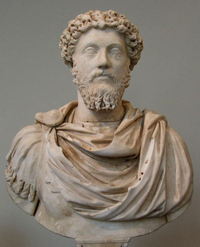
A bust of Marcus Aurelius,
Metropolitan Museum of Art
,
New York
.
Most of the credit for the war’s success must be ascribed to subordinate
generals, the most prominent of which was
C. Avidius Cassius
, commander of III Gallica,
one of the Syrian legions. Cassius was a young senator of low birth from the
north Syrian town of
Cyrrhus
. His father, Heliodorus, had not been a
senator, but was nonetheless a man of some standing: he had been Hadrian’s ab
epistulis, followed the emperor on his travels, and was prefect of Egypt at
the end of Hadrian’s reign. Cassius also, with no small sense of self-worth,
claimed descent from the
Seleucid kings
. Cassius and his fellow
commander in the war, Martius Verus, still probably in their mid-thirties, took
the consulships for 166. After their consulships, they were made governors:
Cassius, of Syria; Martius Verus, of Cappadocia.
At Rome, Marcus was occupied with family matters. Matidia, his great-aunt,
had died. However, her will was invalid under the lex Falcidia: Matidia
had assigned more than three-quarters of her estate to non-relatives. This was
because many of her clients were included in
codicils
to her will. Matidia had never
confirmed the documents, but as she was dying, her clients had sealed them in
with the original, making them valid. Fronto urged Marcus to push the family’s
case, but Marcus demurred, saying his brother would make the final decision.
On the return from the campaign, Lucius was awarded with a
triumph
; the parade was unusual because it
included the two emperors, their sons and unmarried daughters as a big family
celebration. Marcus Aurelius’ two sons,
Commodus
five years old and Annius Verus of
three, were elevated to the status of Caesar for the occasion.
The returning army carried with them a plague, afterwards known as the
Antonine Plague
, or the Plague of
Galen
, which spread through the Roman Empire
between 165 and 180. The disease was a
pandemic
believed to be either of
smallpox
or
measles
, and would ultimately claim the lives
of two
Roman emperors
—Lucius
Verus, who died in 169, and Marcus Aurelius, whose family name,
Antoninus, was given to the epidemic. The disease broke out again nine years
later, according to the Roman historian
Dio Cassius
, and caused up to 2,000 deaths a
day at Rome, one-quarter of those infected. Total deaths have been estimated at
five million.
A possible contact with
Han China
occurred in 166 when a
Roman traveller visited the Han court
, claiming
to be an ambassador representing a certain Andun, who can be identified either
with Marcus Aurelius or his predecessor Antoninus Pius.
Legal and administrative work, 161–80
Like many emperors, Marcus spent most of his time addressing matters of law
such as petitions and hearing disputes. Marcus took great care in the theory and
practice of legislation. Professional jurists called him “an emperor most
skilled in the law” and “a most prudent and conscientiously just emperor”. He
shows marked interest in three areas of the law: the manumission of slaves, the
guardianship of orphans and minors, and the choice of city councillors (decuriones).
In 168 he revalued the
denarius
, increasing the silver purity from 79%
to 82% — the actual silver weight increasing from 2.57 grams to 2.67 grams.
However, two years later Marcus reverted to the previous values because of the
military crises facing the empire.
War
with Germanic tribes 166–180

The Roman Empire during the reign of Marcus Aurelius. His annexation
of lands of the Marcomanni and the Jazyges – perhaps to be
provincially called
Marcomannia
and Sarmatia – was cut
short in 175 by the revolt of Avidius Cassius and in 180 by his
death.
During the early 160s, Fronto’s son-in-law Victorinus was stationed as a
legate in Germany. He was there with his wife and children (another child had
stayed with Fronto and his wife in Rome). The condition on the northern frontier
looked grave. A frontier post had been destroyed, and it looked like all the
peoples of central and northern Europe were in turmoil. There was corruption
among the officers: Victorinus had to ask for the resignation of a legionary
legate who was taking bribes.
Experienced governors had been replaced by friends and relatives of the
imperial family. L. Dasumius Tullius Tuscus, a distant relative of Hadrian, was
in Upper Pannonia, succeeding the experienced M. Nonius Macrinus. Lower Pannonia
was under the obscure Ti. Haterius Saturnius. M. Servilius Fabianus Maximus was
shuffled from Lower Moesia to Upper Moesia when Iallius Bassus had joined Lucius
in Antioch. Lower Moesia was filled by Pontius Laelianus’ son. The Dacias were
still divided in three, governed by a praetorian senator and two procurators.
The peace could not hold long; Lower Pannonia did not even have a legion.
Starting in the 160s,
Germanic tribes
and other nomadic people
launched raids along the
northern border
, particularly into
Gaul and across the
Danube
. This new impetus westwards was probably
due to attacks from tribes further east. A first invasion of the
Chatti
in the province of
Germania Superior
was repulsed in 162.
Far more dangerous was the invasion of 166, when the
Marcomanni
of Bohemia, clients of the Roman
Empire since 19, crossed the Danube together with the
Lombards
and other German tribes. At the same
time, the Iranian
Sarmatians
attacked between the Danube and the
Theiss
rivers.
Due to the situation in the East, only a
punitive expedition
could be launched in 167.
Both Marcus and Verus led the troops. After the death of Verus (169), Marcus led
personally the struggle against the Germans for the great part of his remaining
life. The Romans suffered at least two serious defeats by the
Quadi
and Marcomanni, who could cross the Alps,
ravage Opitergium (Oderzo)
and besiege Aquileia
, the main Roman city of north-east
Italy.
At the same time the
Costoboci
, coming from the
Carpathian
area, invaded
Moesia
,
Macedonia
and Greece. After a long struggle,
Marcus Aurelius managed to push back the invaders. Numerous Germans settled in
frontier regions like Dacia
,
Pannonia
, Germany and Italy itself. This was
not a new thing, but this time the numbers of settlers required the creation of
two new frontier provinces on the left shore of the Danube, Sarmatia and
Marcomannia
, including today’s Czech Republic
and Hungary. Some Germans who settled in
Ravenna
revolted and managed to seize
possession of the city. For this reasion, Marcus Aurelius decided not only to
bring more barbarians into Italy, but even banished those who had previously
been brought there.
The emperor’s plans were, however, prevented by a revolt in East, led by
Avidius Cassius, which was prompted by false news of the death of Marcus after
an illness. Of the eastern provinces, only
Cappadocia
and
Bithynia
did not side with the rebels. When it
became clear that Marcus Aurelius was still alive, Cassius’ fortunes declined
quickly and he was killed by his troops after only 100 days of power.
Together with his wife Faustina, Marcus Aurelius toured the eastern provinces
until 173. He visited Athens, declaring himself a protector of philosophy. After
a triumph in Rome, the following year he marched again to the Danubian frontier.
After a decisive victory in 178, the plan to annex
Bohemia
seemed poised for success but was
abandoned after Marcus Aurelius again fell ill in 180.
Death and succession
180
.JPG/220px-0_Marcus_Aurelius_-_Piazza_del_Campidoglio_(3).JPG)
Bronze statue of Marcus Aurelius,
piazza del Campidoglio
in
Rome
.
Marcus Aurelius died on 17 March 180, in the city of Vindobona (modern
Vienna
). He was immediately deified and his
ashes were returned to Rome
, and rested in
Hadrian
‘s
mausoleum
(modern
Castel Sant’Angelo
) until the
Visigoth
sack of the city
in 410. His campaigns against
Germans and Sarmatians were also commemorated by a
column
and a
temple
built in
Rome.
Marcus gave the succession to his son
Commodus
, whom he had named Caesar in 166 and
made co-emperor in 177. This decision, putting an end to the series of “adoptive
emperors”, was highly criticized by later historians since Commodus was a
political and military outsider, as well as an extreme egotist with neurotic
problems.
At the end of his history of Marcus’ reign, Cassius Dio wrote an
encomium
to the emperor, and described the
transition to Commodus, to Dio’s own times, with sorrow.
…[Marcus] did not meet with the good fortune that he deserved, for he
was not strong in body and was involved in a multitude of troubles
throughout practically his entire reign. But for my part, I admire him
all the more for this very reason, that amid unusual and extraordinary
difficulties he both survived himself and preserved the empire. Just one
thing prevented him from being completely happy, namely, that after
rearing and educating his son in the best possible way he was vastly
disappointed in him. This matter must be our next topic; for our history
now descends from a kingdom of gold to one of iron and rust, as affairs
did for the Romans of that day.
– Cassius Dio 71.36.3–4
Michael Grant, in The Climax of Rome (1968), writes of Commodus: “The
youth turned out to be very erratic or at least so anti-traditional that
disaster was inevitable. But whether or not Marcus ought to have known this to
be so, the rejections of his son’s claims in favour of someone else would almost
certainly involved one of the civil wars which were to proliferate so disastrous
around future successions.”
Legacy and reputation
Marcus Aurelius acquired the reputation of a
philosopher king
within his lifetime, and the
title would remain his after death; both Dio and the biographer call him “the
philosopher”. Christians—Justin
Martyr, Athenagoras, Melito—gave him the title too. The last named
went so far as to call Marcus “more philanthropic and philosophic” than
Antoninus Pius and Hadrian, and set him against the persecuting emperors
Domitian and Nero to make the contrast bolder. “Alone of the emperors,” wrote
the historian Herodian, “he gave proof of his learning not by mere words or
knowledge of philosophical doctrines but by his blameless character and
temperate way of life.”
The 1964 movie
The Fall of the Roman Empire
and the 2000
movie
Gladiator
featured characters based on him.
Both plots posited that Marcus Aurelius was assassinated because he intended to
pass down power to Aurelius’s adopted son, a Roman general, instead of his
biological son Commodus.
Attitude towards
Christians
Although, before becoming emperor, Marcus Aurelius followed the lenient line
of the emperors Hadrian
and
Antoninus Pius
, he is listed among the
persecutors of Christians
along with
Nero,
Domitian
and
Decius
. Henry Wace attributes his severity as
emperor to rivalry between the rising teachers of Christianity and the
professors of the school of
Stoicism
to which the emperor belonged, to a
personal bitterness to which he gave expression in his Meditations, and
to the occurrence of natural calamities that the populace attributed to the
anger of the gods against those who denied them and that the Christians saw as
signs of the end of the world.
Marriage and children

Bust of Faustina the Younger,
Louvre
,
Paris
.
Aurelius married his
first cousin
Faustina the Younger
in 145. During their
30-year marriage Faustina bore 13 children. Only one son and four daughters
outlived their father:
-
Annia Aurelia Galeria Faustina
(147–after
165)
- Gemellus Lucillae (died around 150), twin brother of Lucilla
- Annia Aurelia Galeria
Lucilla
(148/50–182), twin sister of
Gemellus, married her father’s co-ruler
Lucius Verus
- Titus Aelius Antoninus (born after 150, died before 7 March 161)
- Titus Aelius Aurelius (born after 150, died before 7 March 161)
- Hadrianus (152–157)
- Domitia Faustina (born after 150, died before 7 March 161)
- Annia Aurelia
Fadilla
(159–after 211)
-
Annia Cornificia Faustina Minor
(160–after
211)
- Titus Aurelius Fulvus Antoninus (161–165), twin brother of Commodus
- Lucius Aurelius Commodus Antoninus (Commodus)
(161–192), twin brother of Titus Aurelius Fulvus Antoninus, later emperor
-
Marcus Annius Verus Caesar
(162–169)
-
Vibia Aurelia Sabina
(170–died before 217)
Writings
While on campaign between 170 and 180, Aurelius wrote his
Meditations
in Greek as a source for his
own guidance and self-improvement. The title of this work was added
posthumously—originally he entitled his work simply: “To Myself”. He had been a
priest at the sacrificial altars of Roman service and was an eager patriot. He
had a logical mind and his notes were representative of
Stoic
philosophy and spirituality.
Meditations
is still revered as a literary
monument to a government of service and duty. The book has been a favourite of
Frederick the Great
,
John Stuart Mill
,
Matthew Arnold
,
Goethe
,
Wen Jiabao
, and
Bill Clinton
.
It is not known how far Marcus’ writings were circulated after his death.
There are stray references in the ancient literature to the popularity of his
precepts, and
Julian the Apostate
was well aware of Marcus’
reputation as a philosopher, though he does not specifically mention the
Meditations. The book itself, though mentioned in correspondence by
Arethas of Caesarea
in the 10th century and in
the Byzantine Suda
, was first published in 1558 in Zurich by
Wilhelm Holzmann, from a manuscript copy that is now lost. The only other
surviving complete copy of the manuscript is in the
Vatican library
.
Nerva–Antonine family tree
- (1) = 1st spouse
- (2) = 2nd spouse (not shown)
- (3) = 3rd spouse
- SMALL CAPS = posthumously deified (Augusti,
Augustae
, or other)
- dotted lines indicate adoption or (in the case of
Hadrian
and
Antinous
) alleged lovers
|





.jpg/220px-Zeus_Ammon_(Antikensammlung_München).jpg)




.JPG/220px-0_Marcus_Aurelius_-_Palazzo_Nuovo_-_Musei_Capitolini_(1).JPG)








.JPG/220px-0_Marcus_Aurelius_-_Piazza_del_Campidoglio_(3).JPG)

